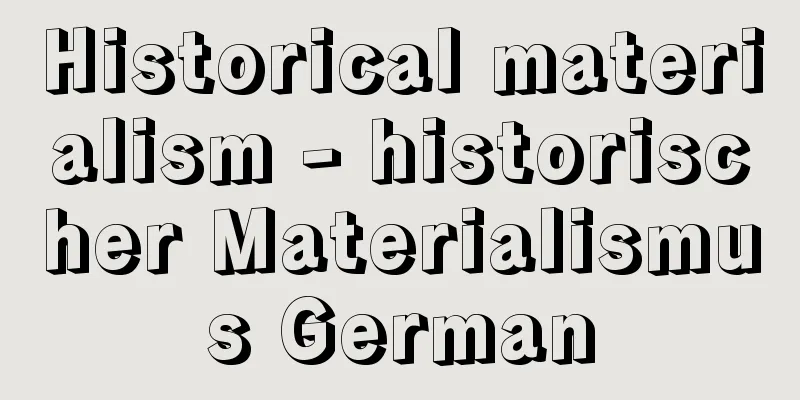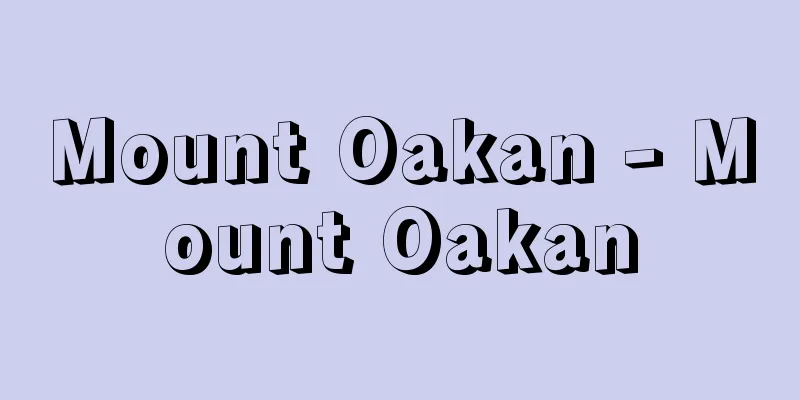Historical materialism - historischer Materialismus German

|
This refers to the materialistic view of history advocated by Marx and Engels. It is opposed to historical idealism or the idealist view of history, as well as non-historical and mechanistic materialism. It is an important component of the philosophy of Marxism or scientific socialism. [Shibata Shingo] Overview of the theory[1] Based on a natural history worldview of the universe, celestial bodies, the earth, and life, human society is also viewed as a natural history process. Of course, unlike the natural world, humans are conscious and actively create history. However, humans create history based on and are constrained by natural conditions and the achievements of previous generations. Furthermore, humans act actively, but their actions collide and cancel each other out, resulting in results that are independent of human consciousness, like the composite force of countless "parallelograms of forces." In this way, natural and inevitable laws permeate social history, mediated by countless human actions, motivations, and coincidences. [2] What ultimately determines the history of society is the “production and reproduction of real life” of human beings; more specifically, the two kinds of production: (1) the production of the means of subsistence and means of production through labor, and (2) the production of the next generation of life through reproduction. As history progresses, however, (1) comes to determine (2). [3] Labor is the activity that developed and formed humans from apes. Natural historical presuppositions and labor are the most fundamental driving forces of social development. The ability of labor to control nature is called (a) productive forces. This productive force is determined by productive forces (specifically, the natural conditions of the labor subject, human labor capacity, technology, natural science, its application ability, population, labor organization, means of transportation, etc.). The form in which these productive forces are combined is called (b) mode of production or mode of labor (for example, agriculture, handicrafts, large-scale industry, large-scale agriculture, etc.). Then, determined by (a) and (b), (c) relations of production, that is, relations of possession and ownership of the means of production, are formed. The totality of these relations of production in each society is called the "economic structure" or "economic social composition" of that society. It is a material social relationship that is formed independently of human consciousness. [4] Human society was originally a primitive community in which all people worked together, restricted by low productive forces. However, with the development of productive forces, the emergence of the division of labor, private property, and commodity exchange, the community began to break down, people split into classes, and class society was born. In response to the productive relations of private property, that is, class relations, (d) a legal and political superstructure centered on the state, and (e) forms of social consciousness or ideologies (social psychology, religion, philosophy, art, etc.) were formed. In contrast to the material social relations mentioned above, (d) and (e) are called ideological social relations. (a), (b), and (c) basically determine (d) and (e), but the latter also have a relative uniqueness and act in reaction to the former. [5] The principal forms of this class society are slavery, feudalism, and capitalism, and since their appearance, history has been a history of class struggle. The forms of class struggle are determined by (a), (b), and (c). (c) is determined by the development of (a) and (b), but when (c) cannot keep up with the development of (a) and (b) and becomes a hindrance to them, (c) is transformed into a form that is more adaptable to it. With this, an era of social revolution begins, and (d) and (e) are also transformed gradually or rapidly. [6] Capitalist society is the last form of antagonistic class society. (a) the productive forces or productive forces (especially the formation of many individual worker subjects, the technological and scientific revolutions, the socialization of labor, the all-round development of the means of transport, etc.) and (b) the mode of production (large-scale industry) that develop within it create the material conditions for the resolution of this antagonism. On this basis, capitalist society is transformed by the working class seizing state power, and after a long transitional period, a co-operative productive society is realized, free from exploitation, plunder, violence, and class domination, in which "the free development of each is the condition for the free development of all." With this, the prehistory of mankind ends and the main history begins. In this way, historical materialism was the first to scientifically explain the necessity and contingency of social history and the role of individuals and the masses, and established the scientific foundations of the social sciences and the science of history. [Shibata Shingo] Subsequent developmentsAfter Marx and Engels, research into historical materialism was deepened, especially in the areas of state theory, ideology theory, and revolution theory. In this regard, the contributions of Lenin, Gramsci, Lukacs, Tosaka Jun, Nagata Hiroshi and others are highly valued. Historical materialism is not a completed dogma. It is a theory in the process of development, with many issues to be addressed, including further elucidation of its basic concepts and their interrelationships. [Shibata Shingo] "The German Ideology" by Marx and Engels (translated by Kozai Yusige, Iwanami Bunko / translated by Mashimo Shinichi, Otsuki Shoten, Kokumin Bunko)" ▽ "Critique of Political Economy" by Marx (translated by Takeda Takao et al., Iwanami Bunko / translated by Sugimoto Toshiro , Otsuki Shoten, Kokumin Bunko)" ▽ "On Feuerbach" by Engels, translated by Fujikawa Satoru and Akima Minoru (Otsuki Shoten, Kokumin Bunko) [References] | |Source: Shogakukan Encyclopedia Nipponica About Encyclopedia Nipponica Information | Legend |
|
マルクスとエンゲルスによって提唱された唯物論的歴史観=唯物史観のこと。史的観念論ないし観念論的歴史観ならびに非歴史的・機械論的唯物論に対立する。それは、マルクス主義ないし科学的社会主義の哲学の重要な構成部分である。 [芝田進午] 学説の概要〔1〕宇宙・天体・地球・生命などについての自然史的世界観を前提として、人間社会をも自然史的過程としてとらえる。もちろん、人間は、自然界とは違い、意識をもち能動的に歴史をつくる。しかし、人間は、自然的諸条件と、先行する世代の達成とを前提とし、それに制約されて、歴史をつくる。また、人間は、能動的に行動するが、その行動が衝突し相殺しあって、無数の「力の平行四辺形」の合成力のように、人間の意識から独立した結果がもたらされる。このようにして、社会の歴史においては、無数の人間の行動、意欲、偶然性に媒介されつつ、自然史的・必然的な法則性が貫徹する。 〔2〕社会の歴史を究極的に規定するものは、人間の「現実の生活の生産と再生産」、より具体的には、(1)労働による生活手段・生産手段の生産、(2)生殖による次の世代の生命の生産という2種類の生産であるが、歴史の発展とともに、(1)が(2)を規定するようになる。 〔3〕類人猿から人間を発展させ形成させた活動は労働である。自然史的前提と労働が社会の発展のもっとも基本的な原動力である。労働が自然を支配する能力を(a)生産力という。この生産力は、生産諸力(具体的には、労働対象としての自然諸条件、人間の労働能力、技術、自然科学、その応用能力、人口、労働組織、交通手段など)によって決められる。この生産諸力の結合の様式が(b)生産様式ないし労働様式(たとえば、農業、手工業、大工業、大規模農業など)である。そして、この(a)(b)に規定されて、(c)生産諸関係すなわち生産手段の占有・所有諸関係が形成される。それぞれの社会におけるこの生産諸関係の総体が社会の「経済構造」ないし「経済的社会構成」とよばれる。それは、人間の意識から独立に形成される物質的社会関係である。 〔4〕人間社会は、初め、低い生産力に制約されて、すべての人が共同で労働する原始共同体であった。しかし、生産諸力の発展、分業、私的所有、商品交換の出現によって、共同体の崩壊が始まり、人々は諸階級に分裂し、階級社会が生まれた。私的所有の生産諸関係すなわち階級関係に照応して、(d)国家を中心とする法律的・政治的上部構造、(e)社会的意識諸形態ないしイデオロギー(社会心理、宗教、哲学、芸術など)が形成された。前述の物質的社会関係に対して、(d)(e)はイデオロギー的社会関係とよばれる。(a)(b)(c)が(d)(e)を基本的に規定するが、後者も相対的独自性をもち、前者に反作用する。 〔5〕この階級社会の主要な形態は、奴隷制、封建制、資本制であり、その出現以来、歴史は階級闘争の歴史である。階級闘争の形態は、(a)(b)(c)に規定される。(c)は(a)(b)の発展に規定されるが、(c)が(a)(b)の発展に照応できず、その桎梏(しっこく)になるとき、(c)はより適応できる形態に変革される。これとともに社会革命の時代が始まり、(d)(e)も徐々に、あるいは急速に変革される。 〔6〕資本制社会が敵対的階級社会の最後の形態である。その胎内で発展する(a)生産力ないし生産諸力(とくに多数の個性をもつ労働者主体の形成、技術革命、科学革命、労働の社会化、交通手段の全面的発展など)、(b)生産様式(大工業)が、この敵対の解決の物質的条件をつくりだす。それらを前提として、労働者階級が国家権力を掌握することによって、資本制社会は変革され、長期の過渡期を経て、搾取・収奪・暴力・階級支配がなく、「各人の自由な発展がすべての人の自由な発展の条件である」ような共同生産制社会が実現される。これとともに人類の前史が終わり、本史が始まる。 このようにして史的唯物論は、社会の歴史の必然性と偶然性、個人と大衆の役割を初めて科学的に説明し、社会諸科学、歴史科学の科学的基礎を確立した。 [芝田進午] その後の発展マルクスとエンゲルス以後、史的唯物論の研究は、とくに国家論、イデオロギー論、革命論などの分野でいっそう深められた。この点で、レーニン、グラムシ、ルカーチ、戸坂潤(とさかじゅん)、永田広志(ながたひろし)らの貢献が高く評価される。史的唯物論は完成されたドグマではない。その諸基本概念とそれらの相互関係のいっそうの解明をはじめとして、なお研究さるべき課題に満ちた発展過程の学説である。 [芝田進午] 『マルクス、エンゲルス著『ドイツ・イデオロギー』(古在由重訳・岩波文庫/真下信一訳・大月書店・国民文庫)』▽『マルクス著『経済学批判』(武田隆夫他訳・岩波文庫/杉本俊朗訳・大月書店・国民文庫)』▽『エンゲルス著、藤川覚・秋間実訳『フォイエルバッハ論』(大月書店・国民文庫)』 [参照項目] | |出典 小学館 日本大百科全書(ニッポニカ)日本大百科全書(ニッポニカ)について 情報 | 凡例 |
<<: Phyteuma japonicum (Asyneuma japonicum) - Phyteuma japonicum (English name)
Recommend
silencer
…In such cases, a silencer is a device installed ...
Divan
…In the 18th century, during the reign of Louis X...
Councillor - Giseikan
A legislative body in the early Meiji period. On ...
Sata [town] - Sata
An old town in Kimotsuki District, at the southern...
Callicarpa dichotoma (English spelling) Callicarpadichotoma
…[Murata Gen]. … *Some of the terminology that me...
Supervision - Kansei
In the ancient Chinese educational system, the Tai...
Olea Piri - Olea Piri
…It is usually a large panel made of planks attac...
Universalism
…He returned to Uruguay in 1932 and established a...
Port town - Minatomachi
A settlement with port facilities and a distribut...
Shugoro Yamamoto - Yamamoto Shugoro
Novelist. Born on June 22, 1903, in Shimo Hatsuka...
"Kayu Honso" - Kayu Honso
...Chinese herbal medicine. Originally, it was th...
Humperdinck - Engelbert Humperdinck
German composer. He studied under F. Hiller at th...
Red Cliffs
[1] The southern bank of the Yangtze River in Jiay...
Ranaishikawae (English spelling)
… [Takahiro Matsui]. … *Some of the terminology t...
Biskupin
...The number of Bronze Age ruins is even greater...









